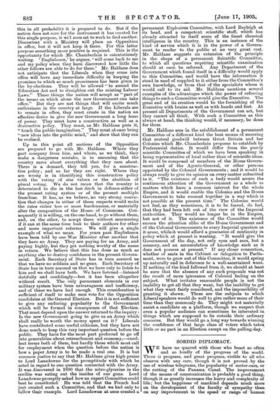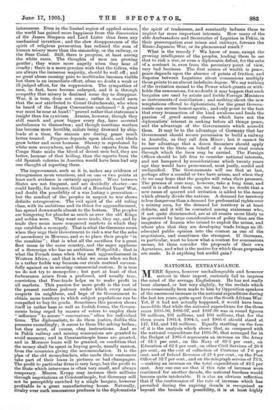SORDID DIPLOMACY.
WE have no quarrel with those who boast so often• and so loudly of the progress of the world. There is progress, and great progress, visible to all who observe with any care, though it is not proved by the use of wireless telegrams, the popularity of motor-cars, or the cutting of the Panama Canal. The improvement of the means of communication is probably a good thing, though it so greatly increases the hurry and complexity of life ; but the happiness of mankind depends much more on the development of the faculty of sympathy than on any improvement in the speed' or range of • human intercourse. Even in the limited region of applied science, the world has gained.more happiness from the discoveries of Sir James Simpson and Lord Lister than from any mechanical invention ; and the slow disappearance of the spirit of religious persecution has reduced the sum of human misery more than the steamship, or the railway, or the Suez Canal. Still, there is progress, at least among the white races. The thoughts of men are growing gentler ; they wince more angrily when they hear of cruelty; there is a more genuine wish that the toilers, who are always the immense majority, should be well off ; and no great abuse causing pain to multitudes becomes visible but there is an immediate effort, often no doubt a weak or ill-judged effort, for its suppression. The sympathies of men, in fact, have become enlarged, and it is through sympathy that misery is destined some day to disappear. War, it is true, does not cease ; rather it would. seem that the mot attributed to Count Goluchowski, who when he heard of the Hague Convention exclaimed " A great war must be near at hand ! " proved rather that statesman's insight than his cynicism. Armies, however, though they still march and grow bigger every day, have accreted ambulances to themselves ; and though maritime warfare has become more horrible, sailors being drowned by ship- loads at a time, the seamen are during peace much better treated. Progress depends upon ideals, and ideals grow better and more humane. Slavery is reprobated by white men everywhere, and though the reports from the Congo State make the blood of decent men boil, they are better, because of that boiling, than the reports from the old Spanish colonies in America, would have been had any one thought of reporting them.
The improvement, such as it is, makes any evidence of retrogression more vexatious, and on one or two points at least such evidence is certainly apparent. Wars between States are not frequent, and are decidedly shorter—we could hardly, for instance, think of a Hundred Years' War, and doubt the possibility of a war lasting a generation— but the conduct of the peoples in respect to war shows definite retrogression. The evil spirit of the old ruling class, with its ambitions and its thirst for aggrandisement, has spread downwards almost to the bottom. The peoples are hungering for plunder as much as ever the old Kings and nobles were. They want more trade, they say, and by trade they mean more conquered markets in which they can establish a monopoly. That is what the Germans mean when they urge their Government to risk a war for the sake of ascendency in Morocco, and so to place their people "in the sunshine " ; that is what all the sacrifices for a great fleet mean in the same country, and the eager applause of a Sovereign who has an ambitious Weltpolitik ; that is what the French mean when they seek aggrandisement in Western Africa ; and that is what we mean when we fret in a rather feeble way because our rivals contend success- fully against us in securing commercial custom. It is true we do not try to monopolise ; but part at least of that forbearance arises from a profound, and usually true, conviction that Free-trade helps us to make profit in all markets. This passion for more profit is the root of the present restless jealousy under which every nation suspects its neighbour, and begs of its Government to obtain more territory in which subject populations can be compelled to buy its goods. Sometimes this passion shows itself in rather base as well as foolish forms, the Govern- ments being urged by masses of voters to employ their " influence ' to secure " concessions," often for individual firms. The diplomatists, to do them justice, dislike this pressure exceedingly ; it seems to them like askine.° bribes but they must, of course, obey instructions. And so in Pekin railway and mining concessions are granted to avoid menaces ; and in Constantinople loans are granted, and in Morocco loans will be granted, on condition that the money shall be spent in buying goods, usually cannon, from the countries giving the accommodation. It is the plan of the old moneylenders, who made their customers take part of their loans in pictures or bad champagne. The profit to particular firms is very large, but the profit to the State which intervenes is often very small, and always temporary. Messrs. Krupp may increase their millions through negotiations at Constantinople, but Germany will not be perceptibly enriched by a single bargain, however profitable to a great manufacturing house. Naturally, rivalry over such concessions produces in the diplomatists the spirit of tradesmen, and constantly induces them to neglect far more important interests. How many of the able Ambassadors and Secretaries of Legation in Pekin, in their preoccupation over mines and .railways, foresaw the Russo-Japanese War, or its phenomenal result ?
What is the remedy ? We know of none, except the growing intelligence of the peoples, leading them to see that to risk a war, or even a diplomatic defeat, for the sake of a contract is, even from the pecuniary point of view, very bad business. The first source of wealth is peace, peace depends upon the absence of points of friction, and disputes between Legations about concessions multiply those points to an almost indefinite degree. We say nothing of the irritation caused to the Power which grants or with- holds-the concessions, for no doubt it may happen that such bargains are used by astute and feeble Foreign Ministers as instruments of conciliation ; and nothing about the new temptations offered. to diplomatists, for the great Govern- ments can secure honest agents ; and only point to the fact that every transaction of the kind awakens and feeds the passion of greed among classes which have not the diplomatists' interest in seeking before all things peace, and the advantage of the Governments which accredit them. It may be to the advantage of Germany that her Government should secure permission to build a railway in Anatolia, as they call Asia Minor ; but it cannot be to her advantage that a dozen financiers should apply pressure to the State on behalf of a dozen rival routes through which the lines may be carried. The Foreign Offices should be left free to consider national interests, and not hampered by considerations which twenty years ago they would have pronounced, most justly, sordid and undignified. The Governments will see that at last, perhaps after a scandal or two have arisen, and when they do we may hope that the peoples will relax their pressure. The process of cure may, however, take a long time, and until it is effected there can, we fear, be no doubt that a. new cause of quarrel and irritation is added to the many which already divide the nations. A demand for territory is less dangerous than a demand for preferential rights over a, mining area, for the demand for territory is at least definite, and it will be contested among statesmen who, if not quite disinterested, are at all events more likely to be.governed by large considerations of policy than are the magnates of finance who intend to exploit the mines, and whose plea, that they are developing trade brings an ill- educated public opinion into the contest as one of the negotiators, and sometimes, the strongest. If Germans, in particular, want to know what a contest for concessions means, let them consider the proposals of their own Agrarians, and what is the motive for which those proposals are made. Is it anything but sordid gain ?







































 Previous page
Previous page